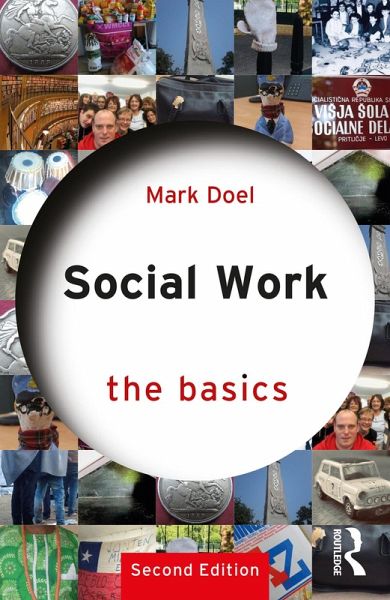Ohomai Institute of Technology, Aotearoa/NZ
Mark Doel is recognised as a key figure in social work education with his ability to blend theory and practice so effectively. This important text illustrates nicely how well deserved that reputation is. Social work is a highly demanding but rewarding profession. This book serves an important purpose in making sure that newcomers to the profession get off to a good start in terms of rising to the challenges and appreciating the rewards.
Neil Thompson, visiting professor at the Open University, UK
This book is intended as an introduction to the profession of social work. While there are lots of books which will introduce the social policy, the law and the theory which underpin modern social work, this book concerns itself with more global and timeless issues such as why social work exists; what its purpose is; and why it is structured in the way that it is. The book has 7 chapters. The first concerns the origins of social work and its relationship with social policy and politics and the tensions between reformist and more radical approaches. The second chapter looks at the how social work is represented in the media, how its public image has been shaped, and how these things impact the profession. There is some consideration of the blame culture and how this affects social work morale and why it is social work's reputation that is most likely to be tarnished when things go wrong. The focus then moves in the third chapter to the types of people who social workers engage with professionally and considers some ethical issues in social work practise. This chapter succinctly introduces the range of social problems that social workers encounter and describes numerous factors affecting practise such as remote work, eligibility criteria and engaging "hard to reach" groups. The fourth and fifth chapters respectively consider how social work services are structured and how social workers are educated. The fifth chapter also has an interesting discussion about the relationship between social work and evidence and what social workers expect from research. The final two chapters are outward and future facing, considering the global challenges and opportunities for social work and what social work could yet aspire to become. Chapter 6 contains particularly interesting discussions about contemporary topics such as globalisation and environmentalism. There is also discussion of what decolonising social work could entail and the implications for social work practice of thinking globally and environmentally. The chapters themselves make good use of subheadings and this is a book which can easily be dipped into or revisited when the reader wants to read Dole's take on a particular issue. It is possible to read a short section or series of sections on their own rather than a whole chapter and still understand what is being conveyed. However, the book is so engagingly written that the reader is likely to carry on to finish the chapter. Thus, the book serves simultaneously as a guided introduction to social work and as a short encyclopaedia with which to get a very basic understanding of a particular concept or issue. Helpfully, the book gives a list of websites and suggested further reading at the end of each chapter together with a few lines explaining how the references night be useful. This is a much needed book at a time when few social work students understand the origins of their profession, who its pioneers were or how the profession has come to be practised and managed as it is today. As Doel points out in his Introductory Chapter, the history of social work has been squeezed out of the curriculum in social work education by competing topics. Doel, eloquently and succinctly explains the competing priorities and expectations which public opinion and social policy have placed on social work and their consequences for those entering the profession. The book has an optimistic and inspiring style, which is refreshing at a time when social work media focusses on high caseloads, burnout, spending cuts and the high attrition rates in the profession. This, coupled with the accessible and jargon free writing makes Social Work: The Basics a book that students will enjoy reading. Each chapter begins with several photos of objects which represent different aspects of social work and which can spark reflection in the solo reader or debate for a class
of students. Each chapter ends with several photos and short profiles of social workers. Together, these act as frames for the content of the chapters, engaging the reader in the topic and illustrating the sheer diversity of what social work means to different people. An important difference between this book and many other social
work texts is that Dole manages to discuss important political issues without coming across as preachy or forcing his own beliefs on the reader. Social work students come from many different backgrounds and with many different faiths and political beliefs. Dole's approach offers the individual reader the opportunity to think about where they stand in relation to the different theories and approaches to social work and social welfare and decide what sort of social workers they want to become. Dole also avoids the nostalgic idealisation of the past or the pessimism about the future which are present in the writing of many of his contemporaries, and this further contributes to the book being an enjoyable read. The title Social Work: The Basics implies that the book is just for beginners. While it does indeed fulfil the function of introducing the profession to someone beginning or contemplating social work training, it could be used as a reflective tool for a social worker at any time in their professional journey. At some point in their careers, most social workers will question whether social work is providing them what they need or what they want to achieve for others. This is where the use of photos and vignettes in the book come into their own. By reading about these people and objects, one can think about what alternatives and possibilities the profession might still offer oneself through career development or a change in role or employer. The book is also useful
for anyone who works alongside or manages social workers and wants to get a better understanding of their training and professional culture. I would recommend this book to anyone who is yet to learn what social work can mean for them, and for people who have learned, but have since forgotten.
Jim Greer MSc, Registered Social Worker and Senior Lecturer in Social Work, University of Cumbria, UK
When reading the title, I was intrigued about the concept of 'the basics' of social work and wondered how it might be possible to get all 'the basics' into one book so wide as the concept of social work is. So, when opening the book, I scanned all the chapters in anticipation of what was to come. Secretly, I was hoping for some
gotcha moment, for how could the basics be covered in one book. Well, glad to say I was disappointed and didn't get my
gotcha moment. Mark has deftly woven the basics of social work into one easily digestible book that was a terrific read. For me the books strength lies in its ability to give brief introductory material that covers a significant amount of ground. Students will particularly like this book as a reference point when they struggle to grasp all the knowledge and issues they need to cover in any social work degree. So, there is a transferability about the book that I like which will cover geographical boundaries, for the content of the book provides essential reading for general social work that is not geopolitically specific but generalist in orientation. Newly qualified social workers will also like this book as it serves as a reminder of the knowledge they need at the earliest stages of practice. Indeed, I would envisage that this book will serve those well who are embarking on initial post qualifying training and education. Each chapter is full of interesting issues and begins with a terrific chapter on the origins of social work. I think this was a great place to start and reminds us of why we do social work in the first place. Caught up in the neoliberal trap that eschews the social contract of governments to protect the most vulnerable, this chapter reminds us that we were initially a reformist profession with radical ideas and acts as a beacon of hope of what social work can do when we act as one. Chapter two - a timely discussion about social works public face - is important, especially today when social work struggles with it's inherent identity and this explores those themes with insight. Chapter three explores how and why people encounter social services. This is an important topic for we need to know service users' journey into receiving services and why we work with some of the people we do. This chapter is important for it is vital that we lift our collective heads and ask 'why is this person here? Why person X and not person Y? Some of this goes to the heart of inequality, patriarchy, capitalism, and oppression, so a useful read. Chapter four examines the career of social work itself, an interesting issue given that we don't often explore what it means to be a professional situated within a profession. These concepts are not benign, for they bring with them certain philosophical dualities centered around the question of do we really need to be a professional to be kind and caring. Chapter five's focus is on education and training. Again, I like the way Mark gives us an outline of the issues but also provides a critical reflection on those issues that goes beyond merely outlining the issues. There is a commentary here - prevalent throughout the book to be fair - that is interesting and refreshing all at once. The advantage here is that we are hearing an honest reflection on the themes considered rather than an account of them. Chapter six gives us the exploration of the local versus the global issue in social work, again, handy for reminding us that social work whilst locally practiced, forms part of a profession that transcends borders and is not limited by local context. Chapter seven provides an appropriate last chapter providing us with a rallying call for resisting marketisation and the neoliberal trick of convincing others that fault lies with the individual and not the society in which that individual is situated. Overall, this is a tremendous book that provides a compact but eloquent outline of the basics in social work. Its main audience will be social work students and newly qualified social workers, though it does provide a provocative prompt to more experienced social workers especially on wider philosophical issues that can be overlooked.
Dr. Paul McCafferty, Doctor of Childhood Studies, Lecturer in Social work, Queen's University Belfast















